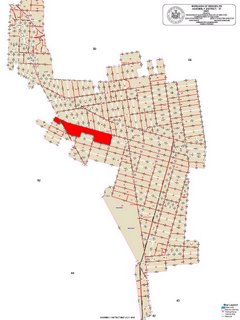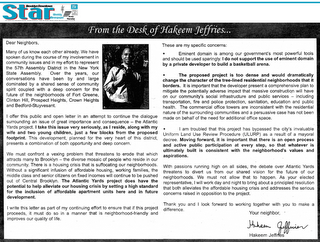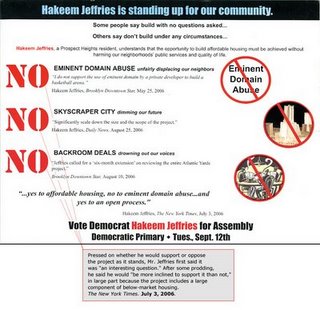 In a Daily News editorial yesterday, headlined Atlantic Yards win by a mile (and immediately promoted on the Atlantic Yards web site, right, and via an e-newsletter) claimed:
In a Daily News editorial yesterday, headlined Atlantic Yards win by a mile (and immediately promoted on the Atlantic Yards web site, right, and via an e-newsletter) claimed:To the runaway victories of Eliot Spitzer and Hillary Clinton on Tuesday night, add one more landslide: The Atlantic Yards project planned for Brooklyn was a huge winner at the polls.
Whether to build the $4.2 billion housing and office complex in Prospect Heights along with an arena for the pro-basketball Nets, was a central issue in five congressional and state races. Candidates who back the development won in four of the contests - and the fifth went to one of Albany's impregnable incumbents.
 Actually, the results are more murky than claimed. Yes, opponents of the project failed in their efforts to establish a referendum against the project. However, support for Atlantic Yards was not a main factor in most of the victories, and the turnout was quite low.
Actually, the results are more murky than claimed. Yes, opponents of the project failed in their efforts to establish a referendum against the project. However, support for Atlantic Yards was not a main factor in most of the victories, and the turnout was quite low.And there's some counter-evidence, as well. Just this week, Community Board 6, representing an area on and beyond the southern border of the proposed Atlantic Yards site, voted overwhelmingly to oppose the plan in its current form. The other two community boards, CB2 and CB8, also are expected to vote on AY.
(At right, boundaries of 57th Assembly District, with proposed Atlantic Yards site in red.)
Congressional races
The editorial stated:
In the most high-profile race, Yards supporter Councilwoman Yvette Clarke won Shirley Chisholm's old congressional seat over three rivals. Only one opposed the project, and he came in last. The pro-development field pulled in more than 80% of the vote.
Rep. Ed Towns beat Councilman Charles Barron, who hammered the development.
Clarke won with fewer than 15,000 votes, in a race that got 18% of registered Democrats, and her web site doesn't even mention Atlantic Yards. (Neither did the sites for David Yassky, whose posture was positive but measured, and Carl Andrews.) As noted, Clarke's strength came from women, voters of Caribbean descent, and the unions backing her.
Barron got 38% of the vote against an 24-year incumbent, and was outspent by a margin of more than 9 to 1 (as of Aug. 23). Without the dubious participation of Atlantic Yards supporter Roger Green, who had no chance but took votes away from Barron, Towns would have been in even more danger. Towns's web site doesn't mention Atlantic Yards.
It's not clear that Barron's voters were necessarily motivated by the Atlantic Yards issue--he's been quite visible as a Councilman, but his web site does mention his stand on AY. Then again, there's little evidence that Towns's votes came because of his support for Atlantic Yards.
 State races
State racesThe Daily News editorial stated:
State Sen. Marty Connor, a booster, decisively defeated anti-project gadfly Ken Diamondstone, who spent more than $265,000 of his own money on his campaign.
Here's another way to look at it. Connor, a veteran of 28 years, got only 55% of the vote. Still, as I pointed out, Diamondstone's totals probably have more to do with the money he spent than the Atlantic Yards issue.
(Above, May 2006 ad from Hakeem Jeffries in the Brooklyn Downtown Star.)
The editorial said:
And Bill Batson, a former union staffer who ran a single-issue, anti-development campaign for the Assembly, got creamed - 64% to 25% - by Hakeem Jeffries, who favors Atlantic Yards. Jeffries won 105 of the 109 election districts in the race.
 Yes Jeffries earned a much higher percentage of the votes, but he had a much longer history among voters, had at least three times as much money as Batson, had union and ACORN support, and his total of 5770 was only 2359 more votes than he earned in 2002. He earned votes from 9.6% of the Democrats in the 57th district.
Yes Jeffries earned a much higher percentage of the votes, but he had a much longer history among voters, had at least three times as much money as Batson, had union and ACORN support, and his total of 5770 was only 2359 more votes than he earned in 2002. He earned votes from 9.6% of the Democrats in the 57th district. Jeffries says he didn't change his position. Perhaps, but he certainly changed his promotion of his position, from a cautious text ad in the spring to one, as the election approached, with dramatic graphics and language. (Note that ad at right is augmented with box at the bottom.)
It's a victory, but it's hardly a definitive sign of Atlantic Yards support. After all, Freddie Hamilton, an unabashed supporter of the project, won only 1008 votes. A "win by a mile" would have carried Hamilton to the top. Rather, undecided voters might have voted for Jeffries based on his advertised call to scale down the project, fight eminent domain, and delay the deliberations.
Did Jeffries ask constituents for support based on his Atlantic Yards stand? It wasn't one of his campaign planks, or even on his web site.
And what about Boyland?
The Daily News editorial said:
Only entrenched incumbent Sen. Velmanette Montgomery managed to survive as a Yards foe.
Note the distorted language here. While Connor, according to the editorial, "decisively defeated" Diamondstone, he got only 55% of the vote. By contrast, Montgomery "managed to survive" but earned 65% of the vote.
It's disappointing that the newspaper took a swipe at Montgomery rather than her law-evading challenger, Tracy Boyland, who still has reported only $100 in spending. Apparently the zeal to promote the project took precedence over the importance of serving as a civic watchdog.
The polls
The editorial concludes:
Add these election results to recent polls, and the result is the same: A solid majority of Brooklynites want the thousands of jobs and affordable-housing units that are included in Atlantic Yards. And the opponents have revealed themselves, once again, to be a small but vocal group that uses press conferences, blogs and bluster to disguise thin support in the neighborhoods they so often claim to represent.
First, a solid majority of Brooklynites didn't vote.
The Crain's poll, as I've argued, was deeply inadequate. As for the depth of the opposition and support, that's hard to measure. What if the poll had asked different questions? What if a deep-pocketed backer (like Cablevision in the West Side Stadium controversy) amplified community concerns? What if the New York Times editorial page didn't feel any pressure to support a project by the parent company's business partner?
Hardly any Atlantic Yards supporters attended the Atlantic Yards community forum Tuesday, and most were union representatives obligated to be there (and who live outside the city). Couldn't that be seen as an absence of support for the project? (Or was it just the flip side of the opposition boycott?)
 Informing the public
Informing the publicWhat if the newspapers had printed graphics that show the project's astounding scale, relative to its neighbors? (Rendering by Jonathan Barkey.) What if any daily newspaper had followed up on the state's untenable claim that the project would bring $1.4 billion in benefits?
Most people polled by Crain's said they weren't following Atlantic Yards closely, and those who did so were more likely to have negative views (though their numbers grew by cutting into the undecideds rather than those positive toward AY).
There are all kinds of ways to shape opinion about this project, but it's safe to say that most people remain underinformed--and most people didn't vote.
Comments
Post a Comment